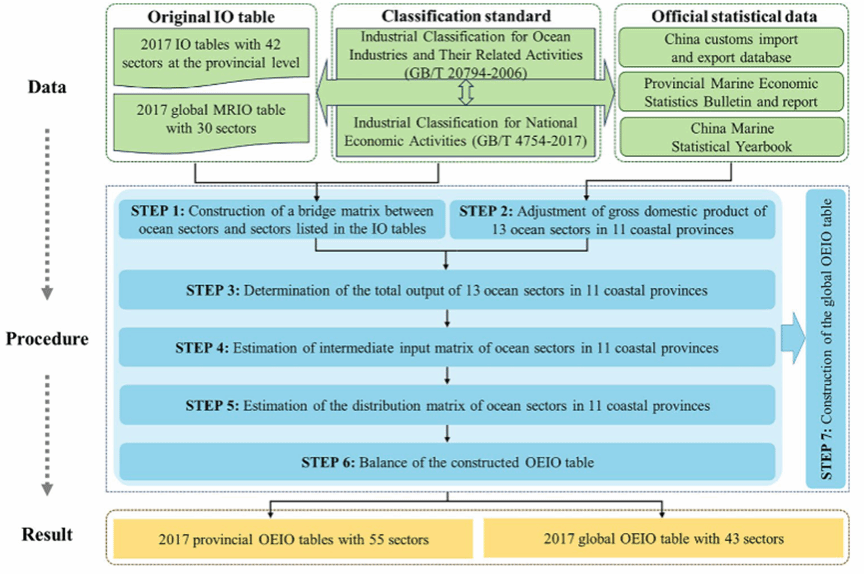党的二十大明确提出“发展海洋经济,保护海洋生态环境,加快建设海洋强国”,将海洋发展提升至国家战略层面。根据中国海洋经济统计公报最新数据,我国海洋生产总值接近十万亿,占国内生产总值的比重约为8%,海洋经济发展正在成为我国经济增长的重要引擎与新质生产力的关键培育点。
在这一战略与现实双重驱动下,张增凯教授聚焦海洋经济可持续发展研究,综合运用管理学、经济学、环境学等多学科研究方法,致力于构建陆海统筹视角下的海洋经济—资源—环境协同调控理论体系与技术框架。他目前牵头承担多项重要课题,包括国家重点研发计划课题《滨海湿地碳汇交易与生态系统服务功能综合评估》,系统评估我国典型滨海湿地碳汇潜力与生态服务价值,并探索基于市场机制的蓝碳交易与生态补偿政策;同时主持国家自然科学基金面上项目《基于全产业链的我国海洋经济隐含碳足迹追溯及减排政策仿真》,从产业链视角构建“海洋经济部门隐含碳溯源模型”,识别关键排放环节,开展多情景政策模拟,为我国海洋产业低碳转型提供理论支撑与决策工具。
在数据方法与实证研究方面,2025年,张增凯教授研究团队基于2017年省级投入产出表和海洋经济统计数据,构建了中国 11 个沿海省份及其13个海洋部门的海洋经济投入产出表(图1),有效弥补了传统经济核算体系在海洋部门分类精细度与数据集成性方面的不足。该成果在海洋经济核算、海洋产业关联分析、海洋经济活动的环境生态影响评估等多个前沿领域具有重要的应用潜力,为我国海洋经济精细化管理、减排政策设计与海洋强国建设提供了扎实的数据基础与方法论支撑。

图1.中国沿海省份海洋经济投入产出表OEIO表的构建过程
未来,张增凯教授将紧密围绕国家“海洋强国”与“双碳”战略需求,聚焦海洋经济绿色转型与可持续发展,重点开展以下方面的研究:
1)海洋经济核算方法与数据库;
2)海洋与社会经济系统耦合模型;
3)智慧海洋综合治理平台;
4)海洋经济可持续发展路径。
个人简介:
张增凯教授于2015年获西安交通大学企业管理专业博士学位,先后在美国伊利诺伊大学香槟分校、英国东英吉利大学国际发展学院访问访学,2022年入职厦门大学担任教授、博导。张增凯教授目前已在Nature Climate Change、Nature Communications、Environmental Science & Technology、Scientific Data等环境领域权威期刊发表学术论文50余篇,出版学术专著4部,先后讲授《环境管理》、《环境管理制度与实践》等多门课程。曾获中华环保联合会自然科学类特等奖、陕西省高等学校科学技术一等奖、天津市高校智库优秀决策咨询研究成果一等奖等。
欢迎访问其个人主页https://mel2.xmu.edu.cn/faculty/ZengkaiZhang/或通过Email联系:zengkaizhang@xmu.edu.cn。
Dr. Zhang Zengkai— Advancing Sustainable Ocean Economy through Interdisciplinary Research
The 20th National Congress of the Communist Party of China explicitly called for “developing the ocean economy, protecting the marine ecological environment, and accelerating the building of a strong maritime country.” According to the latest China Marine Economic Statistics Bulletin, the gross ocean product has approached RMB 10 trillion, accounting for approximately 8% of the national GDP. The marine economy is rapidly emerging as a vital engine of China’s economic growth and a pivotal area for cultivating new quality productive forces.
Driven by both national strategic priorities and practical needs, Dr. Zhang Zengkai focuses on the sustainable development of the ocean economy. Employing an interdisciplinary approach that integrates management science, economics, and environmental studies, he is dedicated to constructing a theoretical framework and technical system for the coordinated regulation of the ocean economy, resources, and environment from a holistic land-sea perspective.
He currently leads several key research projects including a National Key R&D Program project titled Comprehensive Assessment of Carbon Sink Trading and Ecosystem Service Functions in Coastal Wetlands, which systematically evaluates the carbon sink potential and ecological service value of typical coastal wetlands in China, and explores market-based mechanisms for blue carbon trading and ecological compensation policies. Simultaneously, he leads a General Program of the National Natural Science Foundation of China entitled Tracing Embedded Carbon Footprints and Simulating Emission Reduction Policies in China’s Ocean Economy Based on Full Industrial Chains. This project aims to develop a traceability model for embedded carbon in marine economic sectors from an industrial chain perspective, identifies key emission sources, and conducts multi-scenario policy simulations to support the low-carbon transition of China’s marine industries with theoretical insights and decision-making tools.
In the area of data methodology and empirical research, Professor Zhang’s team developed an input-output table for the ocean economy in 2025, covering 11 coastal provinces and 13 marine sectors in China (Figure 1), based on provincial input-output tables and marine economic statistics from 2017. This work effectively addresses the limitations of traditional economic accounting systems in terms of sectoral granularity and data integration specific to marine industries.
The resulting framework offers considerable potential for application in cutting-edge fields such as marine economic accounting, analysis of inter-sectoral linkages within the ocean economy, and assessment of the environmental and ecological impacts of marine economic activities. It provides a critical data infrastructure and methodological foundation for enhancing the precision of marine economic management, designing targeted marine emission reduction policies, and supporting China’s strategy to become a maritime powerhouse.
Looking ahead, Professor Zhang Zengkai will closely align with China’s strategic goals of “Building a Strong Maritime Country” and “Dual Carbon” initiatives, focusing on the green transition and sustainable development of the ocean economy. His future research will prioritize the following key areas: (1) Ocean Economic Accounting Methods and Database Development; (2) Coupled Marine-Socioeconomic System Modeling; (3) Integrated Smart Ocean Governance Platforms; and (4) Sustainable Development Pathways for the Ocean Economy.
Dr. Zhang Zengkai obtained his Ph.D. in Business Administration from Xi’an Jiaotong University in 2015. He was a visiting scholar at the University of Illinois at Urbana-Champaign, USA, and the School of International Development, University of East Anglia, UK. In 2022, he joined Xiamen University as a Professor. Dr. Zhang has published more than 50 papers in leading environmental journals such as Nature Climate Change, Nature Communications, Environmental Science & Technology, and Scientific Data, and has authored four books. He has taught multiple courses including Environmental Management and Environmental Regulation and Practice. He is also a recipient of several prestigious awards, including the Special Prize in Natural Sciences from the All-China Environment Federation, the First Prize of Shaanxi Higher Education Science and Technology Award, and the First Prize of Tianjin University Think Tank Outstanding Decision-Making Consultation Achievement Award.
For more information, please visit his faculty page at:
https://mel2.xmu.edu.cn/faculty/ZengkaiZhang/
or contact him via email at: zengkaizhang@xmu.edu.cn.